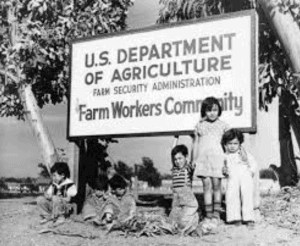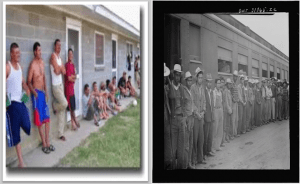North Carolina’s Agricultural Calamity: A Review of the Documentary “Harvest of Dignity”

Over fifty years ago, native North Carolinian Edward R. Murrow’s groundbreaking documentary, “Harvest of Shame” explored issues of housing, pay, and education for farmworkers in the eastern United States. This film created awareness concerning the shortcomings of the agriculture system and led to several legislation changes.
Today, North Carolina ranks as one of the top agricultural producers in the U.S. This system depends on more than 180,000 migrant workers, whose mean salary lingers below $11,000 per year. A Carrboro production company, Minnow Media, with director Donna Campbell, highlights the connections between the 1960’s film “Harvest of Shame” and the current climate for migrant workers and their families in the documentary “Harvest of Dignity.”
Harvest of Dignity highlights the existence of American dream-deprived immigrants, as well as American citizens who are trapped by a system of servitude, mimicking circumstances recognized in even the earliest days of agricultural collectives. In fact, inhumane living conditions in connection to modern farms arguably harken back to slave quarters in the Pre-Civil War Era South. Steve Davis of Migrant Outreach, Greene County Healthcare even classifies farmworker residences in Greene County specifically, as being “barracks style” homes.

Harvest of Dignity portrays a world where immigrant employees, who are commonly on temporary work visas, are required to carry out their work day with no water, and bathroom breaks are often not permitted. A worker from the film calls the work settings “undesirable” and it’s hard to imagine the atrocities that are blanketed beneath that single word. The documentary illustrates camps that are hidden from public view, a tactic that capitalizes on the idea of being out of sight, and as a result, out of the minds of the public. The film reveals images of the disparities experienced by an entire body of people similar to modern day Native American reservations, also strategically hidden from view.
Testimony from one North Carolinian health worker confirms that decades ago, there was a “pitch” used to coerce needy people into working on the farms. The pitch promised food, shelter, and fair pay would be provided for their hard work. The employers singled out new immigrants and the homeless, taking advantage of those with little social power and in need of relief. For decades, those promises went ignored. The same pitch is used today.
|
The documentary asserts that in addition to providing farmworkers with poor living conditions, employers are not properly educating their employee on vital safety practices, and language or educational barriers become causes of serious and even fatal injuries. Employees are being exposed to toxic pesticides on a daily basis, work without regard to impending harm. Isolation leaves little room for education, and treatable illnesses like STI’s go undiagnosed.
Laws that were designed for the health, well-being, and protection of America’s workers are being ignored, or simply excluded from the entire field of agriculture. Business related to agriculture is exempt from the protection of the Fair Labor Standards Act (FLSA), the regulations of the Occupational Safety and Health Administration (OSHA), and minimum wage requirements that most states have adopted. Child Labor Laws are inapplicable to agriculture, allowing Children as young as 10 years old to work a maximum of 30 hours a week. Because poverty is a cycle that is often difficult to break, children of farmworkers become farmworkers themselves before ever reaching adulthood. As a result, they are denied education, advancement, and the freedom to change their lives.

Harvest of Dignity is an important film that gives a glimpse of the stark reality facing many farm workers in North Carolina and throughout the South. In an economy that focuses on “right to work” laws instead of worker’s rights, there is little reason to expect the situation to improve in the foreseeable future. “There is grim irony in speaking of freedom of contract of those who, because of their economic necessities, give their service for less than is needful to keep body and soul together”. Harlan Fiske Stone
Click here to watch Harvest of Dignity online for free.
Post by SCSJ Intern Nadiah Porter

